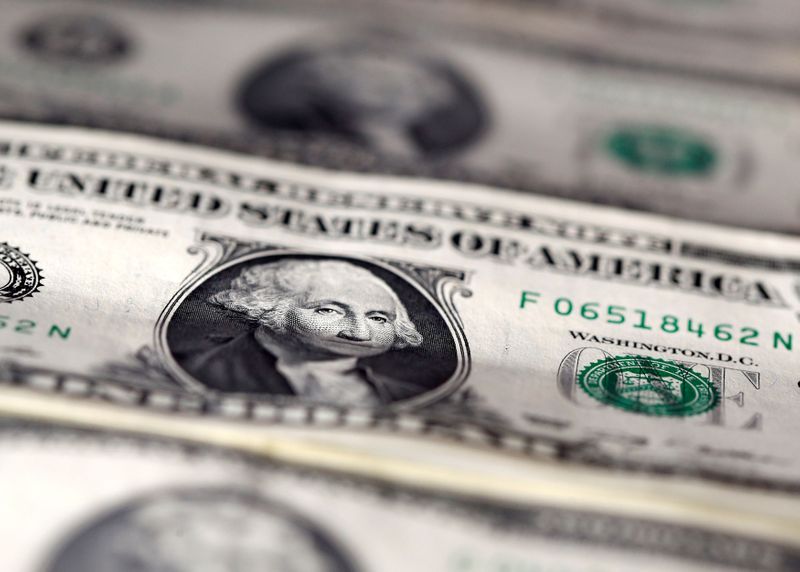By John Revill and Elizabeth Howcroft
LONDON (Reuters) - After years of intervening to dampen the Swiss franc's exchange rate against the euro, Switzerland's authorities may be embarking on another, potentially tougher battle as dollar weakness starts to test their tolerance.
While the Swiss National Bank is unlikely to take any action at its meeting on Thursday, it will almost certainly have considered how to adapt its currency intervention policy to the prospects of a long period of dollar weakness after the Federal Reserve's recent pivot to an ultra-dovish stance.
The problem for the export-reliant Swiss economy is that the trade-weighted franc has surged to five-year highs, making the country's exports more expensive overseas.
The euro, the currency of Switzerland's main trade partner, has firmed this year, suggesting the franc's rise is largely down to its 4.6% year-to-date gain versus the greenback, although on Wednesday it dipped to a seven-week low.
(Graphic: Franc at five year highs link: https://fingfx.thomsonreuters.com/gfx/mkt/qmypmbaebvr/Pasted%20image%201600868562049.png)
"This is a story not only about the euro, but also it is important for the SNB to mitigate the depreciation of the dollar," said Valentin Bissat, senior economist at Mirabaud.
Part of the SNB's dilemma, and the main reason for its intervention policy, is that everyone rushes to buy the safe-haven franc when a crisis hits.
Now, with interest rates at minus 0.75% and in view of its twin mandates of ensuring price stability and supporting exports, the SNB has few other effective options but to intervene to keep a lid on the franc.
But this policy, particularly if seen as targeting the dollar, carries risks, above all that the United States could label Switzerland a currency manipulator, a designation it assigns to countries it thinks are engaging in "unfair currency practices" for a trade advantage.
The latest U.S. report on currency manipulation is due in the coming weeks
Bissat reckons the SNB is already acting against the dollar. While it does not disclose what currencies it is buying, sight deposits at commercial banks – a proxy for SNB interventions – have risen even as the euro strengthened.
(Graphic: SNB sight deposits vs euro link: https://fingfx.thomsonreuters.com/gfx/mkt/yzdpxqxzjvx/Pasted%20image%201600869168598.png)
Bissat estimates the SNB has bought around $20 billion in foreign exchange since the end of June.
Meanwhile, the dollar has become more important for Swiss trade, in particular its large pharma sector, and the United States is Switzerland's second-biggest trading partner, accounting for 42 billion francs in exports last year.
Volatility around the U.S. November elections may also lead to safe-haven flows into the franc.
Peter Kinsella, global head of FX strategy at UBP, expects the franc to strengthen to 0.89 versus the dollar by the end of 2020 and 0.81 by the end of 2021, up from 0.92265 now
"It's (the U.S.) dollar but it's a Swiss problem," said Peter Kinsella, global head of FX strategy at UBP, referring to former Treasury secretary John Connally's remark at a 1971 meeting of finance ministers that the dollar is "our currency but your problem".
MANIPULATOR
Analysts believe the SNB buys euros, then uses those to buy other currencies, though it has also intervened directly in dollar-franc, notably during a 2015 franc surge.
The SNB declined to comment on its dollar strategy, but Chairman Thomas Jordan says he has explained its position to the United States.
Officials have said in the past that interventions are aimed at limiting the appreciation of an "overvalued" currency, rather than at deliberate devaluation to help exporters.
Nonetheless, Mirabaud's Bissat reckons it will be branded a currency manipulator at the Treasury's next review.
"Until now Switzerland met only two (criteria) - their current account balance which is higher than 2 percent of GDP, and the bilateral trade surplus with the U.S., but now they will have the final part – 2% of GDP of net FX purchases," he said.
The implications for Switzerland are unclear but when the United States added China to the list, it then pledged to engage with the International Monetary Fund to eliminate what it called Beijing's unfair competitive advantage. Import tariffs could eventually follow.
And adding to the SNB's headaches, the ECB has made clear it will not tolerate too much euro appreciation.

Meanwhile the euro's run to two-year highs has run out of steam following ECB policymakers' warning. Possibly, the SNB's respite on that front too may have been short-lived.